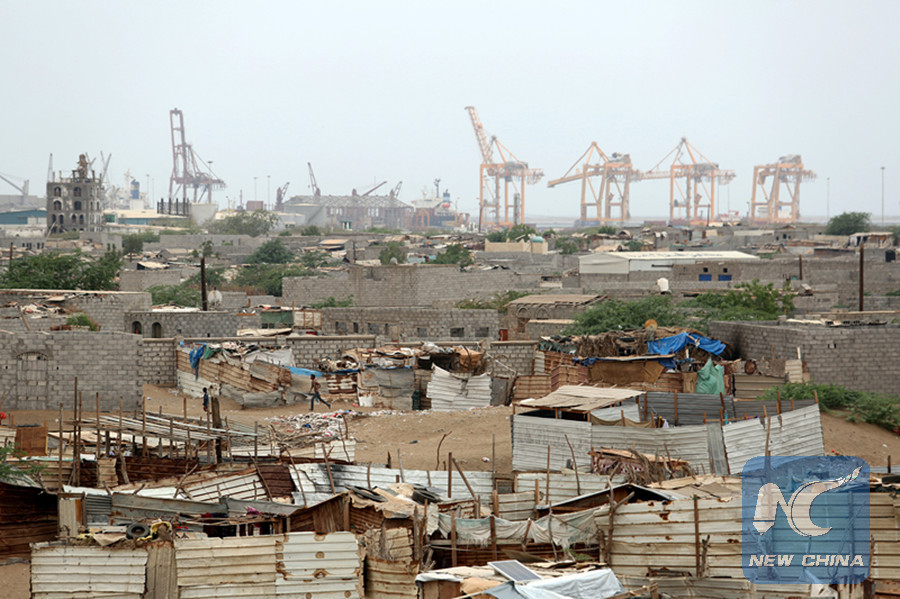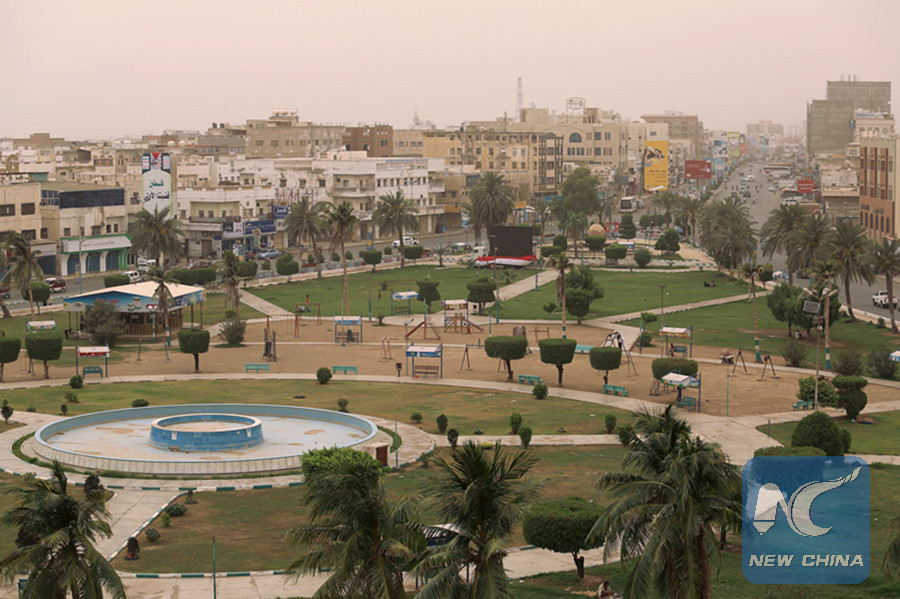
Hodeidah port's cranes are pictured from a nearby shantytown in Hodeidah, Yemen June 16, 2018. (REUTERS)
ADEN, Yemen, June 16 (Xinhua) -- United Nations Envoy to Yemen, Martin Griffiths, arrived Saturday in the capital Sanaa in an effort to salvage the peace process amid a major military operation by the Saudi Arabian-led coalition and pro-government forces to recapture Hodeidah city from the Houthi group.
Sources said Griffiths will discuss with Houthi officials conditions to stop the offensive which analysts said would deal a fatal blow to the political process and deepen the already dire humanitarian situation in the country.
Abdulwahab Al-Sharafi, a political analyst, said that "resuming the political process depends on the success of the UN envoy to convince regional players and their Western backers, not local factions, to be committed to peace."
"The decision is in the hands of foreign players who are not serious about peace and are seeking a war at any cost," he said.
The internationally recognized government said the offensive was launched after all peaceful and political means to convince the Houthis to withdraw from Hodeidah were exhausted and that the military action will now continue until all parts of Yemen are liberated from the Houthis, according to the government-run Saba news agency.
Yaseen Al-Tamimi, a political writer and analyst, said the political solution is considered dead if the offensive continues.
"The coalition will then seek to reshape the political scene in accordance with its priorities that may complicate the situation further. In other words, this is a miscalculation," Tamimi said.
The government and the coalition said the offensive will force the Houthis to come back to the negotiation table as they are accusing the Houthis of using the Hodeidah seaport to smuggle Iranian weapons including ballistic missiles and obstructing the flow of humanitarian aid.
"Such a justification comes within the response of the government and coalition to mounting pressure placed on them by some countries and organizations opposing the operation," Tamimi said.
He added that another problem is that "those opposing the operation are concerned about its consequences but have not taken actions to prevent it."
Local sources said on Saturday the coalition and government forces advanced over the Houthis around the Hodeidah but have been unable to seize control of it because of the landmines installed by the Houthis.
In recent weeks, these forces have seized few districts including Al-Duraihmi south of the city. They are poised to push deeper toward the seaport.
Many families are fleeing the raging battles, the sources said.

View of the Red Sea port city of Hodeidah, Yemen, June 14, 2018. (REUTERS)
Hodeidah is Yemen's second most populated city with around 3 million people living in it, according to official statistics published before the war.
The UN has said that the city currently has a population of 600,000 people.
Around two thirds of the total population of Yemen, around 29 million, live in the Houthi-run regions and the Hodeidah seaport is the only lifeline for most of them.
Observers argued that the impact on the civilians and humanitarian operations will be inevitable.
The Houthis have held the coalition and its backers responsible for the consequences of the operation including likely destruction of the seaport.
They have also threatened to choke off maritime traffic in the Red Sea and to attack coalition warships if they approach Hodeidah.
The UN and humanitarian agencies have warned that disruption to aid supplies will have serious consequences on the humanitarian situation, uring all parties to keep the port open and to provide access to humanitarian aid.
Meanwhile, Abbas Al-Dhaleai, a political commentator, said losing Hodeidah would not mean the end of the war.
"It will choke off a key source of Houthi's income, but I do not expect it will force the Houthis to come back to negotiation table for two reasons, the first is that they will not accept peace after a heavy loss," he argued.
"The second is that the Houthis are still controlling key regions including the capital Sanaa and mountainous regions in the north where the coalition and the government will not risk military operations," he added.
"One more thing, all seaports liberated from the Houthis are still idle. They are not being used for aid delivery or trade activities. What difference will the liberation of the Hodeidah seaport make?" Al-Dhaleai said.
Yemen has the world's worst humanitarian crisis. More than 22 million people are in need of humanitarian assistance and protection including more than 8 million at the risk of famine.
If the situation does not improve, a further 10 million will starve to death by the end of the year, the UN has warned.

